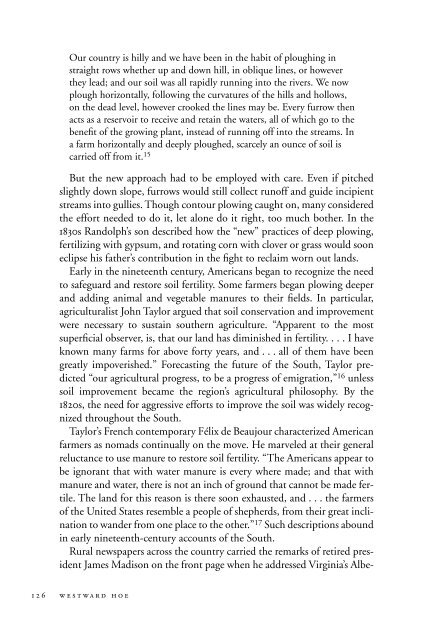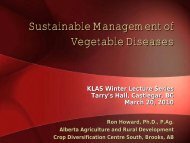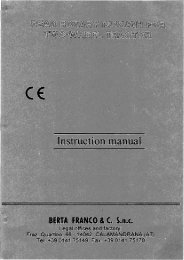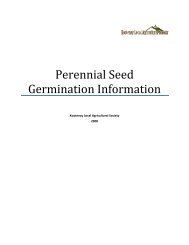Dirt: The Erosion of Civilizations - Kootenay Local Agricultural Society
Dirt: The Erosion of Civilizations - Kootenay Local Agricultural Society
Dirt: The Erosion of Civilizations - Kootenay Local Agricultural Society
Create successful ePaper yourself
Turn your PDF publications into a flip-book with our unique Google optimized e-Paper software.
126<br />
Our country is hilly and we have been in the habit <strong>of</strong> ploughing in<br />
straight rows whether up and down hill, in oblique lines, or however<br />
they lead; and our soil was all rapidly running into the rivers. We now<br />
plough horizontally, following the curvatures <strong>of</strong> the hills and hollows,<br />
on the dead level, however crooked the lines may be. Every furrow then<br />
acts as a reservoir to receive and retain the waters, all <strong>of</strong> which go to the<br />
benefit <strong>of</strong> the growing plant, instead <strong>of</strong> running <strong>of</strong>f into the streams. In<br />
a farm horizontally and deeply ploughed, scarcely an ounce <strong>of</strong> soil is<br />
carried <strong>of</strong>f from it. 15<br />
But the new approach had to be employed with care. Even if pitched<br />
slightly down slope, furrows would still collect run<strong>of</strong>f and guide incipient<br />
streams into gullies. Though contour plowing caught on, many considered<br />
the effort needed to do it, let alone do it right, too much bother. In the<br />
1830s Randolph’s son described how the “new” practices <strong>of</strong> deep plowing,<br />
fertilizing with gypsum, and rotating corn with clover or grass would soon<br />
eclipse his father’s contribution in the fight to reclaim worn out lands.<br />
Early in the nineteenth century, Americans began to recognize the need<br />
to safeguard and restore soil fertility. Some farmers began plowing deeper<br />
and adding animal and vegetable manures to their fields. In particular,<br />
agriculturalist John Taylor argued that soil conservation and improvement<br />
were necessary to sustain southern agriculture. “Apparent to the most<br />
superficial observer, is, that our land has diminished in fertility. ...I have<br />
known many farms for above forty years, and ...all <strong>of</strong> them have been<br />
greatly impoverished.” Forecasting the future <strong>of</strong> the South, Taylor predicted<br />
“our agricultural progress, to be a progress <strong>of</strong> emigration,” 16 unless<br />
soil improvement became the region’s agricultural philosophy. By the<br />
1820s, the need for aggressive efforts to improve the soil was widely recognized<br />
throughout the South.<br />
Taylor’s French contemporary Félix de Beaujour characterized American<br />
farmers as nomads continually on the move. He marveled at their general<br />
reluctance to use manure to restore soil fertility. “<strong>The</strong> Americans appear to<br />
be ignorant that with water manure is every where made; and that with<br />
manure and water, there is not an inch <strong>of</strong> ground that cannot be made fertile.<br />
<strong>The</strong> land for this reason is there soon exhausted, and ...the farmers<br />
<strong>of</strong> the United States resemble a people <strong>of</strong> shepherds, from their great inclination<br />
to wander from one place to the other.” 17 Such descriptions abound<br />
in early nineteenth-century accounts <strong>of</strong> the South.<br />
Rural newspapers across the country carried the remarks <strong>of</strong> retired president<br />
James Madison on the front page when he addressed Virginia’s Albe-<br />
w estward hoe






